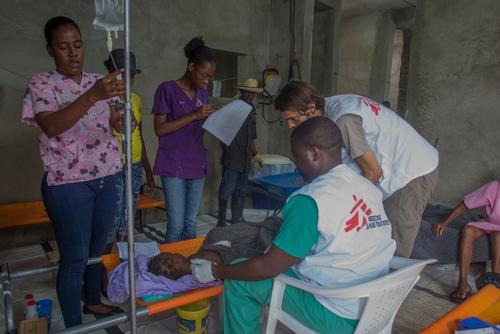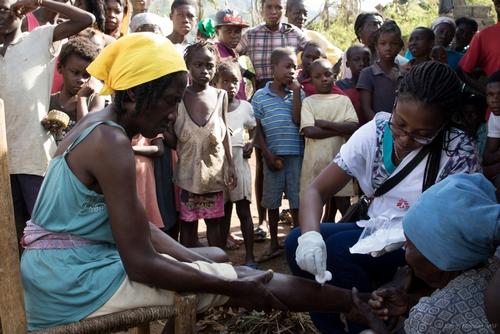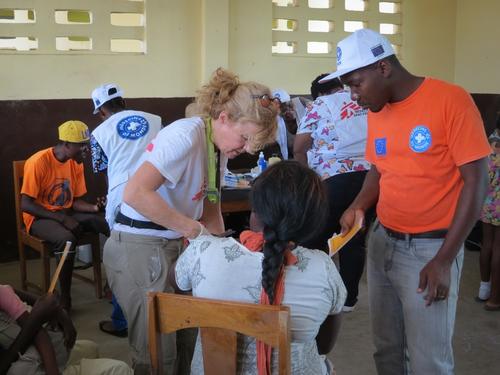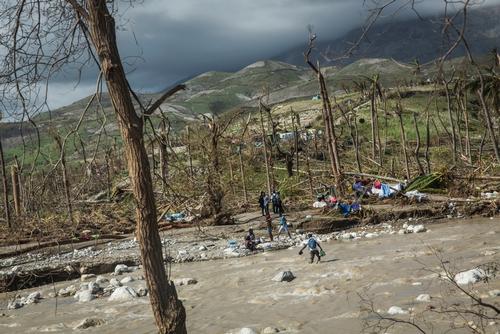Port-au-Prince - It has now been two months since Hurricane Matthew devastated southwest Haiti, and thousands of people are still without adequate food, safe drinking water and shelter.
Médecins Sans Frontières (MSF) is concerned about the deterioration of living conditions, particularly in the departments of Grand'Anse, Sud and Nippes, all of which were affected by the hurricane.
In the Sud and Grand'Anse departments, MSF has set up mobile clinics to assess the general health of children living in the area. Chiara Burzio, the MSF medical coordinator, said that in the last week MSF mobile clinics had "examined and treated 163 children under five who presented with respiratory complications, 60 per cent of whom were suffering from upper respiratory tract infections and 5 per cent of whom had pneumonia or bronchitis". These complications are mostly related to a lack of insufficient shelter, in addition to cold nights spent in the mountains. The other children who came to the clinic had diarrhea and skin infections caused by inadequate access to clean water.
Accessing safe drinking water was already a problem for most Haitian communities, and it only worsened in the wake of the hurricane. Pipe networks were destroyed, and water reservoirs filled with sand. Stuart Garman, the MSF project coordinator, explained that "the lack of actors working to improve water and sanitation in Baradères after the hurricane forced MSF to take emergency action to repair the water supply network and distribute Aquatabs to 10,000 families living in the area". We had been working in the area since 2010 treating cholera.
Many families who lost their homes in the hurricane are still living in temporary shelters such as schools, and they face pressure from local communities who are demanding that authorities evacuate the structures. With nowhere to go, these people need a long-term housing solution.
In the last week, MSF’s Cholera Treatment Centre in Port-à-Piment has admitted seven new patients per day, some of whom have come from neighbouring areas to seek care. This is a spike in new cases compared to the last three weeks of November. Patients arrive at the oral rehydration centres that MSF opened in the mountains and are then transferred to the cholera treatment centre in one of two special ambulances.
On 4 October, a 20-bed cholera treatment centre was opened by MSF and the Ministry of Health in Baradères, Nippes. Since then, MSF has treated more than 190 cholera patients in the Port-au-Prince metropolitan area, and one of its monitoring and rapid response teams is currently stationed on the Island of Gonave to respond to the increase in cholera cases and deaths.
Recently though, MSF teams have begun to close the emergency projects they opened two months ago in Nippes. Fortunately, the cholera epidemic never developed as measures were taken to prevent it.
What has MSF done in seven weeks?
Medical care
- Seen more than 4,500 patients in the departments of Nippes, Grand'Anse and Sud
- Through mobile clinics has treated a large number of people with wounds (800 in total since 8 October), respiratory infections, and diarrhea in Sud and Grand'Anse
- Transferred 30 patients by helicopter, 18 of whom were taken to MSF's trauma centre in Tabarre, in Port-au-Prince
- Provided support to the hospital in Port-à-Piment, and has assisted 14 deliveries since 31 October
Anti-cholera treatment
- Set up a Cholera Treatment Centre in Port-à-Piment and treated 360 suspected cholera cases since 9 October
- Built a 19-bed treatment centre in Baradères
- Supported the Ministry of Health Diquini Cholera Treatment Centre in Port-au-Prince in caring for 190 cholera patients
Water, sanitation and hygiene
- Provided hospital hygiene and sanitation support at the cholera treatment centres in the communes of Moron, Chambellan, Dame-Marie, Anse-d'Hainault, Les Irois and Abricots
- Provided temporary shelter to 1,400 families in the Sud department and distributed 4,500 hygiene kits in the Port-à-Piment valley
- Distributed 3,459,000 litres of drinking water
- Repaired 24 public drinking fountains - 17 in Baradères and seven in Fond Tortue
- Repaired two water catchment systems in the communes of Port-à-Piment
- Distributed 4.5 million Aquatabs in the Sud and Grand'Anse departments and the communes of Baradères and Grand-Boucan in Nippes so that people could treat water at home
Supply distribution
- Distributed reconstruction supplies, including pipes for rainwater collection, as well as sheet metal, cooking and hygiene kits, reservoirs and covers for 850 families in the Cayémites islands.






